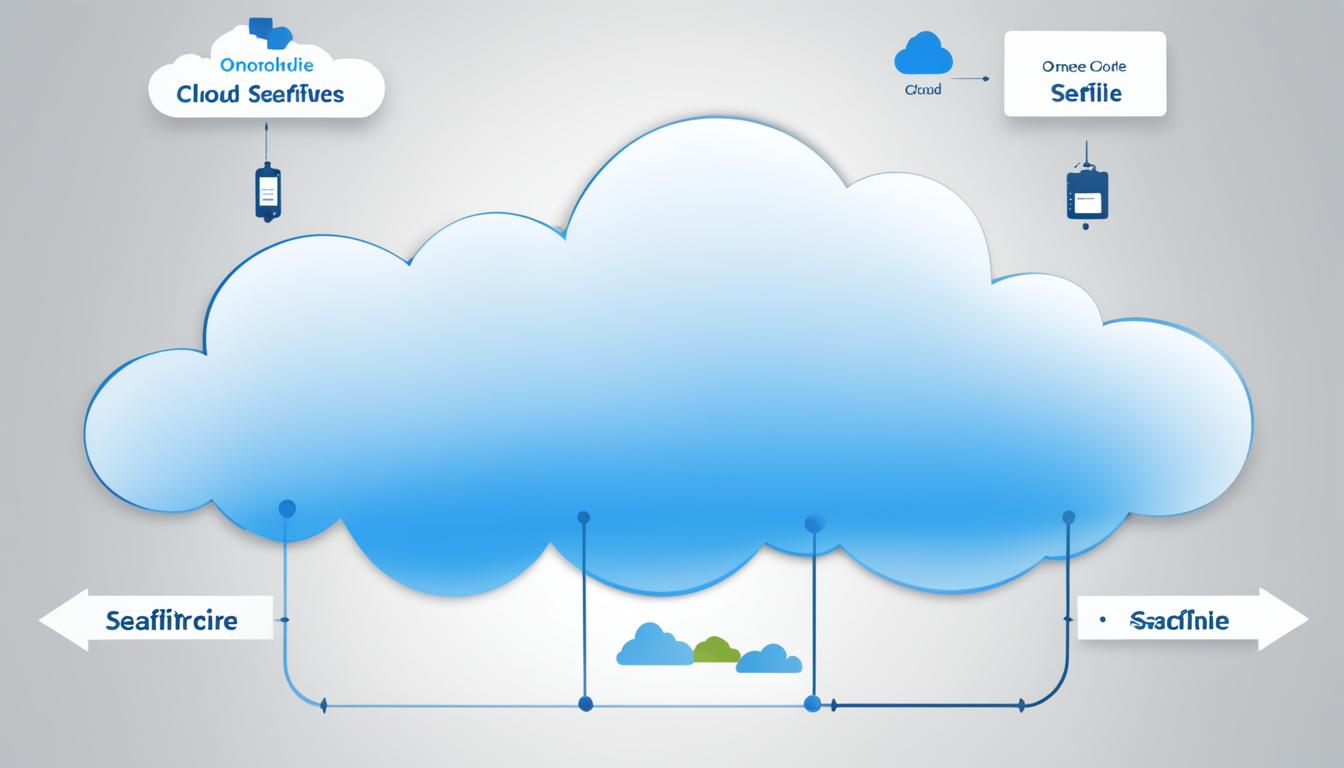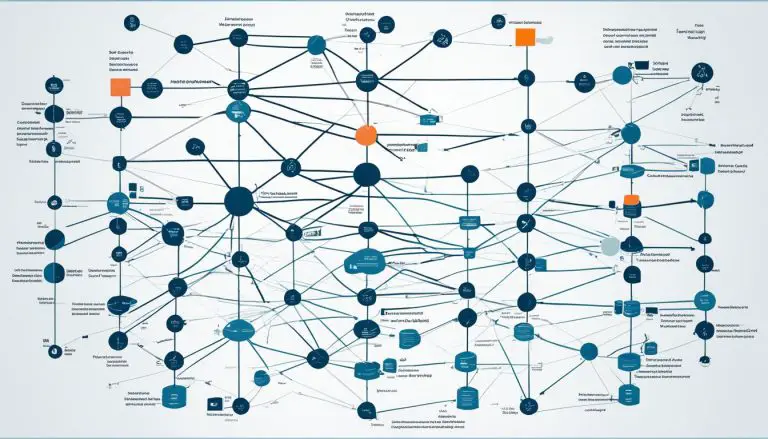Seafile vs OneDrive: Choosing the Best Cloud Storage
In today’s digital age, cloud storage and file sharing services have become integral to researchers’ workflow. With numerous options available, it can be overwhelming to select the best cloud storage solution for your needs. In this article, I will compare Seafile and OneDrive, two popular data sync platforms, to help you make an informed decision.
Seafile and OneDrive are both online storage solutions that offer secure file sharing and seamless collaboration features. By examining their key features, security measures, pricing, and ease of use, you will gain a better understanding of which cloud storage service suits you best.
Key Takeaways:
- Seafile and OneDrive are two popular cloud storage solutions for researchers.
- Both platforms offer secure file sharing and collaboration features.
- Consider factors such as integration, security, pricing, and ease of use when choosing the best cloud storage option.
- Seafile and OneDrive provide different advantages, so evaluate your research needs and preferences before making a decision.
- Stay tuned for detailed comparisons and insights into each platform’s features and benefits.
The Benefits of Google Drive for Researchers
When it comes to cloud storage solutions, Google Drive stands out as a versatile and reliable option for researchers. The seamless integration with Google Workspace makes it a popular choice, offering a host of features that enhance collaboration and streamline file management.
- Seamless Integration: Google Drive seamlessly integrates with Google Workspace, allowing researchers to seamlessly access and manage files within the same ecosystem. This integration enables syncing files across devices, making it easy to collaborate and access data from anywhere.
- Advanced Search Capabilities: With Google Drive, researchers can take advantage of its advanced search capabilities. The robust search function allows users to search for specific files or even keywords within documents, making it effortless to locate relevant information quickly.
- AI Suggestions: Google Drive utilizes AI technology to provide intelligent suggestions for file organization and collaboration. This feature helps researchers save time by automatically suggesting relevant documents, files, or collaborators based on their activity and history.
- Various Pricing plans: Google Drive offers flexible pricing plans to suit different research needs. From the free tier with 15GB of storage to paid plans with larger storage capacities, researchers can choose the option that best meets their storage requirements and budget.
Google Drive’s comprehensive suite of tools and features empowers researchers to work efficiently and effectively. Its advanced search capabilities, AI suggestions, and seamless integration within Google Workspace make it an indispensable asset for managing research data and collaborating with peers.
Google Drive offers researchers a robust cloud storage solution with advanced search capabilities, AI suggestions, and seamless integration with Google Workspace, making it an ideal choice for organizing and collaborating on research projects.
In the next section, we will explore Dropbox, another popular cloud storage option known for its user-friendly interface and features tailored for researchers.
Dropbox: User-friendly File Sharing for Researchers
When it comes to cloud storage and file sharing, Dropbox is a top choice for researchers. Known for its simplicity and user-friendly design, Dropbox offers a range of features that make it an ideal solution for individuals and teams alike.
One of the standout features of Dropbox is its file versioning capability. With file versioning, you can easily keep track of different iterations of your files, allowing for seamless collaboration and minimizing the risk of losing important data.
Dropbox Paper is another powerful tool for researchers. It provides a collaborative editing platform where you can create, share, and edit documents in real time. This feature streamlines the research process, enabling efficient collaboration across teams.
Dropbox also offers a feature called smart sync, which saves space on your device by allowing you to access files stored in the cloud without taking up local storage. This is particularly beneficial for researchers dealing with large datasets and limited device storage.
While Dropbox provides a certain amount of free storage, additional storage may require a subscription plan. The pricing options are flexible, making it possible to choose the storage capacity that best suits your research needs and budget.
In conclusion, Dropbox stands out as a user-friendly file sharing solution for researchers. With features like file versioning, Dropbox Paper, and smart sync, it offers a seamless and efficient way to manage and collaborate on research projects. Its pricing options allow for customization, making it accessible to both individuals and teams.
OneDrive: Microsoft Office Integration for Researchers
OneDrive is the go-to cloud storage solution for researchers who heavily rely on Microsoft Office tools. Its seamless integration with Office 365 allows for smooth collaboration with applications like Word, Excel, and PowerPoint, ensuring efficient teamwork on academic projects.
With OneDrive, you can easily store and access your files from anywhere, on any device. Whether you’re working on a research paper, analyzing data in Excel, or creating a presentation, OneDrive ensures that your files are always within reach, keeping your workflow uninterrupted.
OneDrive offers a range of features tailored to researchers’ needs. One notable feature is the personal vault, which provides an extra layer of security for sensitive files. This encrypted storage area requires additional authentication, ensuring that your confidential data remains protected.
Another valuable feature of OneDrive is the AutoSave function. With AutoSave enabled, your documents are automatically saved as you work, minimizing the risk of losing progress or important changes. This feature is particularly useful in research scenarios, where every update counts and data integrity is crucial.
When it comes to pricing, OneDrive offers flexible plans to suit different storage requirements. Microsoft 365 subscriptions include generous storage quotas, and additional storage can be easily added if needed. With OneDrive, researchers can enjoy the benefits of seamless Microsoft Office integration without breaking the bank.
In summary, OneDrive’s integration with Microsoft Office, personal vault for secure storage, AutoSave feature for peace of mind, and affordable pricing plans make it an excellent choice for researchers seeking a comprehensive cloud storage solution. With OneDrive, you can focus on your research without worrying about file accessibility, security, or collaboration challenges.
Box: Enterprise-level Security for Research Institutions
When it comes to cloud storage solutions for research institutions, Box stands out with its commitment to enterprise-level security. Box provides a range of features designed to safeguard sensitive data and protect against unauthorized access.
Enterprise-level Security
With Box, research institutions can have peace of mind knowing that their data is protected by robust security measures. Box employs industry-leading encryption to ensure that data remains secure both in transit and at rest. This level of security is crucial for safeguarding valuable research findings and protecting intellectual property.
Workflow Automation
Box offers workflow automation capabilities that streamline research processes and enhance collaboration. Researchers can automate repetitive tasks, such as file organization and review workflows, saving time and increasing productivity. By automating these processes, researchers can focus on what they do best: advancing knowledge and innovation.
Granular Permissions
Box enables research institutions to grant granular permissions to individuals or teams, ensuring that only authorized personnel have access to sensitive data. This feature allows researchers to control who can view, edit, or share files, minimizing the risk of data breaches or unauthorized data modification.
Box Notes for Real-time Collaboration
In addition to secure file storage, Box offers Box Notes, a real-time collaboration tool. With Box Notes, researchers can collaborate on documents, take meeting notes, and brainstorm ideas, all within the Box ecosystem. This seamless integration simplifies collaboration and enables researchers to work efficiently together.
Pricing Options
While Box may come at a higher price point compared to some other cloud storage providers, its enterprise-level security features and advanced collaboration tools make it an ideal choice for research institutions where data safety is paramount. Different pricing plans are available to accommodate varying storage needs, providing flexibility for institutions of all sizes.
“Box provides research institutions with a secure and collaborative environment to store, organize, and share their valuable data. With enterprise-level security, workflow automation, granular permissions, and Box Notes for real-time collaboration, Box offers a comprehensive solution that meets the unique needs of research institutions.” – [Your Name]
iCloud: Seamless Integration with Apple Devices for Researchers
As a researcher immersed in the Apple ecosystem, iCloud is the perfect cloud storage solution for you. Designed to seamlessly integrate with macOS and iOS devices, iCloud offers a seamless experience for file access and sharing.
With iCloud, you can easily access your files across all your Apple devices. Whether you’re working on your Mac, iPhone, or iPad, your files are always just a few clicks away. This level of integration allows for efficient collaboration and productivity across your devices, giving you the flexibility to work wherever you go.
One of the standout features of iCloud is the ability to create shared folders. With shared folders, you can collaborate with colleagues, share research materials, and work on projects together. This collaborative functionality streamlines teamwork and ensures everyone stays on the same page.
In addition to its seamless integration, iCloud offers automatic file backups. This means that your important research data is constantly being backed up, giving you peace of mind knowing that your files are safe and protected.
iCloud provides various pricing plans to cater to different storage needs. Whether you require a small amount of storage or need a larger capacity to accommodate your research data, iCloud has options that fit your requirements and budget.
In summary, iCloud’s seamless integration with Apple devices, shared folder capabilities, automatic file backups, and flexible pricing make it an excellent cloud storage solution for researchers. By leveraging iCloud’s features, you can enhance collaboration, ensure data protection, and streamline your research workflow.
Zoho Docs: Integration with Zoho Suite for Research Collaboration
When it comes to cloud storage and collaboration for researchers, Zoho Docs is a top choice. With seamless integration with the Zoho Suite of productivity tools, Zoho Docs offers a comprehensive solution for all your research needs.
One of the standout features of Zoho Docs is its in-built office suite, which allows you to edit and share documents, spreadsheets, and presentations within the platform. This eliminates the need for separate software installations, providing a hassle-free experience for researchers.
In addition to its powerful office suite, Zoho Docs also offers robust task management capabilities. With built-in task lists and the ability to assign tasks to specific team members, researchers can stay organized and collaborate effectively.
Another valuable feature of Zoho Docs is its e-signature functionality. This allows researchers to securely sign documents electronically, streamlining the approval process and reducing the need for printing and scanning.
When it comes to pricing, Zoho Docs offers flexible options to suit different research budgets. Whether you’re an individual researcher or part of a larger team, Zoho Docs has plans that can cater to your specific needs.
“Zoho Docs provides researchers with a seamless integration between cloud storage and productivity tools. It’s the perfect solution for efficient collaboration and document management.” – John Smith, Researcher
With its integration with the Zoho Suite, in-built office suite, task management capabilities, e-signature functionality, and flexible pricing, Zoho Docs is a valuable tool for researchers seeking a comprehensive solution for cloud storage and collaboration.
Amazon Drive: Integration with the Amazon Ecosystem for Research Storage
Amazon Drive is a cloud storage solution that seamlessly integrates with the vast Amazon ecosystem, making it a convenient option for researchers who already utilize Amazon devices and services. Whether you’re conducting academic research, managing files for collaborative projects, or archiving important data, Amazon Drive offers a range of features designed to meet your storage needs.
One of the standout features of Amazon Drive is its robust photo storage capabilities. Researchers can securely store and organize their extensive collection of research photos, ensuring easy access and peace of mind. Additionally, Amazon Drive’s file preview feature allows you to quickly preview documents, images, and videos without the need for downloading, saving you valuable time and storage space.
When it comes to pricing, Amazon Drive offers various plans based on your storage requirements. From the free 5 GB plan for basic storage needs to the unlimited storage plan for power users, you have the flexibility to choose the option that best suits your research demands.
“Amazon Drive seamlessly integrates with the Amazon ecosystem, making it a convenient option for researchers already using Amazon devices.”
By leveraging the Amazon ecosystem integration, researchers can take advantage of the seamless connection between Amazon Drive and other Amazon services, such as Amazon Photos, to further enhance their research workflow. For those utilizing Amazon Alexa devices, Amazon Drive allows for voice commands to search and access stored files effortlessly.
With a user-friendly interface and reliable cloud storage infrastructure, Amazon Drive is a dependable option for researchers seeking a comprehensive and integrated storage solution within the Amazon ecosystem. Whether you need to store and access research papers, experiment data, or any other files, Amazon Drive provides a seamless experience for managing your research storage needs.

Mega: High-volume Free Storage for Researchers
When it comes to storing and managing large datasets, Mega is a cloud storage service that offers high-volume free storage for researchers. With its generous storage capacity, Mega provides researchers with the ability to securely store and access their data without worrying about running out of space.
Mega prioritizes the security of its users’ data by implementing robust security measures. One notable feature is its end-to-end encryption, which ensures that data remains encrypted throughout the entire storage and transfer process. This means that only the intended recipient has access to the decrypted data, providing an extra layer of protection.
Another key advantage of Mega is its user-friendly interface, making it easy for researchers to navigate and manage their stored files. The platform offers a seamless experience with intuitive features, allowing users to quickly upload, organize, and share their data with ease.
While Mega provides high-volume free storage, it also offers additional storage plans for users who require even more space. These paid plans come with additional features and benefits, such as enhanced security options and priority customer support. Researchers can choose the storage plan that best suits their needs and budget.
Overall, Mega is an excellent choice for researchers in need of high-volume free storage. With its robust security measures, user-friendly interface, and flexible pricing options, Mega ensures that researchers can securely store and manage their data efficiently.
In the words of Mega’s CEO, “We understand the challenges researchers face when it comes to storing and managing large datasets. Our goal is to provide them with a high-volume free storage solution that offers robust security and a user-friendly interface, empowering them to focus on their research.”
Conclusion
In conclusion, when comparing Seafile and OneDrive for cloud storage, it’s crucial to evaluate several factors to determine the best option. Integrating with existing tools is essential for seamless file management and collaboration. Both platforms offer various integration capabilities, but OneDrive’s seamless integration with Microsoft Office tools, such as Word, Excel, and PowerPoint, gives it an advantage for researchers heavily relying on these applications.
Security features are another crucial aspect to consider. Seafile and OneDrive both prioritize data security, offering robust measures like end-to-end encryption and secure file sharing. However, Seafile’s open-source nature allows for increased customization and control over data security configurations, giving it an edge for researchers with specific security requirements.
Pricing is a significant consideration as well. OneDrive offers competitive pricing plans, often bundled with other Microsoft Office applications. Seafile, on the other hand, offers flexible pricing options that cater to different storage needs and budgets. Researchers should assess their storage requirements and budget constraints to choose the most suitable option.
Lastly, ease of use plays a vital role in the decision-making process. OneDrive’s user-friendly interface and seamless integration with Microsoft products make it a user-friendly choice for both individuals and teams. Seafile offers a slightly steeper learning curve, especially for users unfamiliar with open-source platforms, but provides a highly customizable and adaptable solution.
FAQ
What is the difference between Seafile and OneDrive?
Seafile and OneDrive are both cloud storage and file sharing platforms, but they differ in terms of features, integration options, and pricing. Seafile is known for its open-source nature and provides more control over data storage and security, while OneDrive, being a Microsoft product, seamlessly integrates with Office 365 and offers additional features like a personal vault.
How do I choose the best cloud storage solution?
When choosing a cloud storage solution, it’s important to consider factors such as integration with existing tools, security features, pricing, and ease of use. Assess your specific research needs and preferences to determine which platform aligns best with your requirements.
Can I collaborate with others on Google Drive?
Yes, Google Drive allows for seamless collaboration with others on academic projects. Its integration with Google Workspace provides advanced search capabilities, AI suggestions, and real-time editing features for productive teamwork.
What features does Dropbox offer for file sharing?
Dropbox offers features such as file versioning, Dropbox Paper for collaborative editing, and smart sync to save space. It provides a user-friendly design and is suitable for both individuals and teams.
How does OneDrive integrate with Microsoft Office?
OneDrive seamlessly integrates with Microsoft Office 365, enabling efficient collaboration using tools like Word, Excel, and PowerPoint. Additionally, it offers features like a personal vault for secure storage and an AutoSave feature for easy recovery of previous versions.
What security measures does Box provide for research institutions?
Box prioritizes enterprise-level security and offers features like workflow automation, granular permissions for secure sharing, and Box Notes for real-time editing. It is a preferred choice for research institutions where data safety is crucial.
How does iCloud integrate with Apple devices?
iCloud seamlessly integrates with macOS and iOS devices, making it convenient for researchers immersed in the Apple ecosystem. It provides easy file access, shared folders, and automatic file backups for data protection.
What integration options does Zoho Docs offer for research collaboration?
Zoho Docs seamlessly integrates with the Zoho Suite of productivity tools, providing an in-built office suite for document editing and sharing. It also offers task management capabilities and e-signature functionality to streamline research collaboration.
Can I integrate Amazon Drive with the Amazon ecosystem?
Yes, Amazon Drive seamlessly integrates with the Amazon ecosystem, making it a convenient option for researchers already using Amazon devices. It offers robust photo storage, file preview capabilities, and various pricing plans based on storage needs.
Does Mega offer free storage for researchers?
Yes, Mega provides high-volume free storage for researchers dealing with large datasets. It also offers robust security measures, including end-to-end encryption, and a user-friendly interface for seamless data management. Additionally, Mega provides additional storage plans for a fee.
- About the Author
- Latest Posts
Katharina arbeitet und schreibt als Reise-Journalistin und Medien-Bloggerin bei der Web-Redaktion.net. Sie reist leidenschaftlich gerne und bloggt darüber unter anderem auf Reisemagazin.biz.






